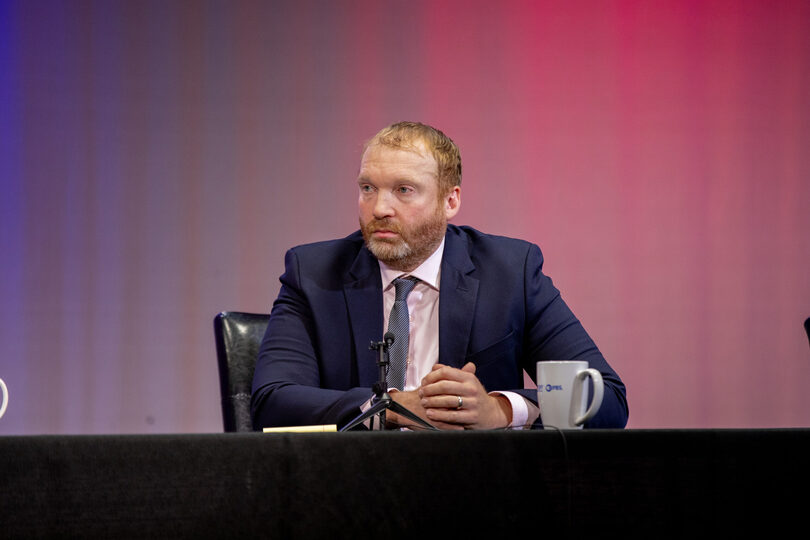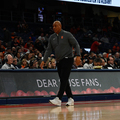No yard signs, no endorsements, few donors: Tim Rudd’s ‘unlikely’ mayoral candidacy

“You’re not gonna see any yard signs, you’re not gonna see any endorsements and I don't want to raise any money.” Independent Syracuse mayoral candidate Tim Rudd is running an isolated, atypical campaign set on turning the page on the establishment. Leonardo Eriman | Photo Editor
Get the latest Syracuse news delivered right to your inbox.
Subscribe to our newsletter here.
Tim Rudd is an atypical mayoral candidate. He’s the first to say it.
“You’re not gonna see any yard signs, you’re not gonna see any endorsements and I don’t want to raise any money,” Rudd said at an Oct. 14 debate.
The city of Syracuse’s former budget director launched a bid for mayor in January. He hasn’t campaigned much since the summer, when he got 1,700 signatures to get his name on the November ballot as an independent.
His Elmwood home is an unassuming campaign headquarters. There are no campaign signs. No get-out-the-vote postcards. He has no campaign staff. PBS Kids plays for his children in the background, and a wall of “Vacant” graffiti eyes adorns his study.
As Election Day nears, Rudd manages a handful of rental properties and works on projects around his house, like the homemade basketball court in his driveway. His priorities include picking up his kids from school and attending their sporting events, tending to the chickens and fruit trees in his garden.
And, of course, running for mayor.
To win next week, Rudd said he needs an online campaign to catch fire, or for Owens to “implode.”
“I do all I can to be visible and communicate my ideas within the constraints we have,” Rudd said. “Over the course of this year, I’m confident I have knocked more doors than any other candidate in the race by far.”
Rudd announced his candidacy on the steps of his childhood Eastwood home alongside his father, William, and wife, Arati. In August, the mayoral hopeful held a solo press conference on the steps of City Hall with nothing but his phone and a bike.
“I feel like the people who know me most are like, ‘That dude’s got heart, and he’s hard working and he’s truthful,’” Rudd said.
Rudd said he’s the only mayoral candidate to win a Syracuse election. Democrat Sharon Owens was named current mayor Ben Walsh’s deputy mayor when he was elected. Republican Thomas Babilon is a nonprofit attorney and former city lawyer. Fellow independent Alfonso Davis has mounted a handful of campaigns but remains in the losing column on election nights.
Rudd, however, has also lost. In 2015, he lost to now-County Executive Ryan McMahon for the 15th district Onondaga County Legislature seat, and in 2023, against Maurice “Mo” Brown in a primary election for the same seat.
Rudd echoes the voices of other Owens challengers, arguing both she and Walsh are “establishment” candidates tied to “the system” and donors.
He is running on a status quo shake-up platform, voicing similar sentiments to other candidates who suggest the city needs a fresh start after years of the Walsh administration, reflected in his attacks on Owens during debates.
“I made the decision to speak the truth, and I’ll stand by it. And in a way, I think that’s the kind of leader we need,” Rudd said. “A leader who’s not gonna follow the crowd, but who’s gonna do what they think is right, and who has genuine roots in the community.”
His nine-point platform lays out multiple sectors he would target as mayor, including “fully funded” police and fire departments and a “U-turn” for the Syracuse Housing Authority. Although his plan includes few details on how he would realize these goals, Rudd said his in-office policy would differ from Owens’, whom he often calls “Walsh 2.0,” a title Owens rejects.
As mayor, Rudd would be stricter on drug abuse, particularly in public. He said homeownership is a solution to the city’s intergenerational poverty and is a major priority he would have in his first months in office.
Programs encouraging home development and the city dropping its current “punitive approach to landlords” would improve Syracuse’s housing conditions, he said.
“Way more people in Syracuse who don’t own their home could own their home than people who will get a job at Micron,” Rudd said.
Despite his isolated campaign, Rudd backs his “unlikely” bid with his city government experience and lifelong Syracuse connection. He’s been involved in Syracuse politics since his 2017 at-large election to the Syracuse Common Council.
Rudd was born and raised in Eastwood and graduated from Henninger High School. He later attended Syracuse University as a political science undergraduate in 2004, and stayed for a master’s in public administration in 2007.
Brown previously hoped to recruit Rudd to run for county executive in 2022. He said he thought it was admirable that Rudd voted against the police budget when he was a common councilor a few years ago.
But when Rudd made controversial slave breaker comments directed at Walsh and Owens, Brown said he drew a “hard line.” After those comments, Rudd was fired from the budget office in February after being placed on paid administrative leave on Jan. 31.
“The mayor and his team decide they need to discredit me, and they do so with a racial strategy. ‘Oh, let’s make him a racist,’” Rudd said. “So, they take the thing I said, and I think they sensationalize it intentionally.”
Rudd criticized the mayor last year over a $10 million IT contract after a company reported being paid $90,000 by City Hall for work it never did on the IT modernization project. He cited the controversy as a reason for his mayoral bid.
Rudd said his alarm-raising burned bridges with Walsh, and suggested he has been punished for it ever since. He points to the disagreement as a demonstration of his fight and willingness to tell the truth, traits he said make him equipped to be mayor.
“I’ve always been that way, whether it’s in my caucus with the council, whether it’s in private with the mayor and his team, I’ve always shared every idea I have, which is a lot,” Rudd said. “I push for things, and I think are right or wrong, and that makes me hard to deal with — and probably made me appealing to have on their team.”
Rudd is convinced Owens — and Walsh by extension — targeted him.
“These people, they punish (you) if you’re not loyal,” Rudd said. “They reward loyalty and they punish disloyalty. So I’m living proof, don’t mess with them.”
Rudd also expressed bitterness over Owens’ attempt to take him and others in the race off the ballot. In June, Owens alleged that signature fraud warranted removing Rudd. She previously attempted to take two Democratic candidates, including Davis, off the primary ballot earlier in the year.
A campaign spokesperson for the Owens campaign said at the time the challenges were “protecting the integrity of the ballot and promoting fair and honest elections.”
Rudd’s explanation of his candidacy varies: to clear his name, perhaps to get back at his former boss. But he sees a few scenarios where he “has a shot” to emerge from election night as an unexpected winner.
“All I can do is be on the ballot, be thoughtful and people get to think about it, and I hope they do think about it and they look into it,” Rudd said. “And if they do, I think I’m the best candidate all day long.”






